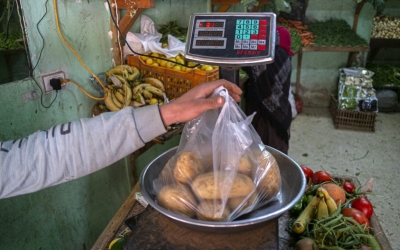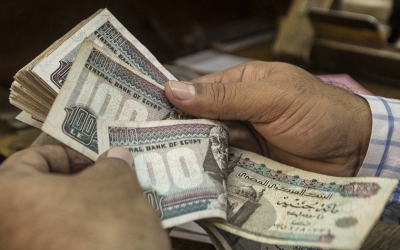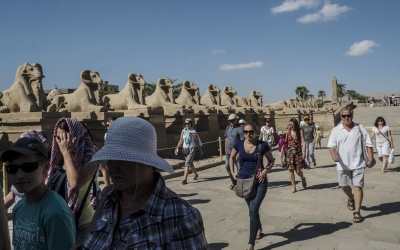Russia-Ukraine war: Egypt introduces austerity as conflict wrecks economy

Egypt is introducing a series of austerity measures at the beginning of April to cope with the economic fallout from the war in Ukraine.
The government has already sent notices to different ministries and government agencies asking them to reconsider their spending, an official source told a local newspaper in late March.
New MEE newsletter: Jerusalem Dispatch
Sign up to get the latest insights and analysis on Israel-Palestine, alongside Turkey Unpacked and other MEE newsletters
The measures will include a curb on unnecessary travel to other countries by government officials, the source said.
He added that the cutbacks would include the termination of the contracts of a large number of government advisors.
The ministries will have to postpone the implementation of all new projects, while ones that are necessary to implement will have to get personal approval from the ministers concerned, the source said.
According to the new scheme, government agencies are not allowed to hire new workers.
The same agencies are not allowed to offer any tax or customs exemptions to traders or suppliers without approval from the ministers concerned, the official source said.
He noted that the government's spending priorities in the coming period would be limited to social protection programmes for the poor and the purchase of basic commodities for members of the public.
Large picture
The new austerity measures are part of comprehensive efforts by the Egyptian government to reduce spending, bring down the budget deficit and take the edge off the nation's spiralling debts.
The new measures, economists say, come against the background of the Russian invasion of Ukraine.
Nonetheless, Egypt started this austerity drive years ago, especially in late 2016 when it brought in changes to obtain a $12bn loan from the International Monetary Fund (IMF).
The drive included the liberalisation of the exchange rate of the Egyptian pound, the introduction of tax reforms, and the institution of a value-added tax.
It also included slashing all types of subsidies, such as fuel, water and electricity subsidies which used to cost the government tens of billions of pounds every year.
The government is also drafting a new property tax law to ease the registration of properties, and increase state revenues from this registration process.
'Instead of the loans, we should work to attract local and foreign investments to the local market'
- Huda al-Malah, International Center for Economic Studies
The same drive also included the suspension of new employment in the public sector in Egypt's bid to reduce the size of this bloated sector.
The government says that it will resume its privatisation programme this year, a process of selling off state companies that started under the late president Hosni Mubarak, but came to a screeching halt with his downfall in 2011.
"The economic reforms implemented in the past years have more than just rescued the economy, given the poor condition of this economy before these reforms," Ahmed Diab, a member of the Economic Committee in the House of Deputies (lower chamber of parliament) told Middle East Eye.
"These reforms have helped our country overcome many of the challenges it faced in these years."
The reformist drive came against the background of a rising debt-to-gross domestic product (GDP) ratio.
In 2021, the ratio was 91 percent and the government attributed it to the Covid-19 pandemic, which had noticeably crippled the Egyptian economy.
The ratio was 108 percent in 2017, according to Finance Minister Mohamed Maait.
Egypt hopes to reduce the debt-to-GDP ratio to below 90 percent by June this year.
"Debts are always worrying because they eat up most revenues and leave nothing for investments," Huda al-Malah, the head of local think tank International Center for Economic Studies, told MEE. "Instead of the loans, we should work to attract local and foreign investment to the local market."
IMF 'dictations'
There is a widespread belief that the austerity measures are being dictated by the IMF, especially after Egypt officially requested support from the international lender to offset the effects of the Ukraine war on its economy.
On 26 March, Minister Maait said the expected IMF programme would aim to maintain economic and financial stability, enhance structural reforms, and maintain the resilience of the Egyptian economy to withstand external shocks in case the war in Ukraine dragged on for a long time.
Two days earlier, the IMF said a set of macroeconomic and structural policy measures would mitigate the impact of the Ukraine war on the Egyptian economy, protect the vulnerable, and preserve Egypt's resilience and medium-term growth prospects.
On 24 March, Maait revealed that the new IMF programme would possibly include additional financing to support Egypt's plans for comprehensive economic reforms.
If obtained, this financing will be the second tranche of funds to Egypt from the IMF in less than six years.
In November 2016, the IMF approved an extended arrangement of $12bn for Egypt under the Extended Fund Facility for the populous Arab country.
'Economic' war
The new austerity measures prove that the war in Ukraine is having effects on the Egyptian economy that will impact the economy for years to come, economists said.
"The war in Ukraine is having far-reaching effects on the national economy and nobody knows where things will stop," al-Malah said. "This is an economic war that is affecting the international economy as a whole."
The Ukraine war has come at a bad time for Egypt, which has been trying to recuperate from the effects of Covid-19 on its economy.
Apart from putting the brakes on some of its most important revenue sources, the pandemic also caused the government to up its spending on health, social welfare and support for different sectors of the economy, including tourism and the industrial sector.
The tourism sector, which contributes 12 percent of GDP and employs one in every ten workers, was shut down for six months in 2021, causing Egypt to lose revenues up to $1bn every month.
When the sector reopened, tourist arrivals were nowhere near pre-pandemic levels.
The war in Ukraine dealt an additional blow to the economy, because of Egypt's overdependence on wheat imports from Russia and Ukraine.
The Egyptian tourism sector is also heavily dependent on tourists from the two countries.
Egypt has already lowered its forecast for growth of the economy to 5.5 percent for the fiscal year 2022-2023, from a previous forecast of 5.7 percent.
Impact on the poor
The finance minister has sought to allay fears that a new IMF programme could impose additional burdens on ordinary Egyptians, who are already suffering from declining real incomes.
Egyptians have been tightening their belts since the finalisation of the 2016 loan deal with the IMF, with fears on the street that the new measures will hit those on lower incomes.
'The government is badly in need of taking decisions to protect the members of the public against being negatively affected by these austerity measures'
- Adel Amer, economist
The flotation of the exchange rate of the Egyptian pound caused it to lose over 50 percent of its value to the US dollar, weakening purchasing power for millions of Egyptians.
The government also reduced water, fuel, and electricity subsidies, causing the monthly bills of all households to soar in an unprecedented manners.
Coupled with the economic effects of the war in Ukraine, the new measures will make life difficult for tens of millions of people in a country where almost 30 percent of the population is poor, economists said.
Economists also express fears that by trimming spending, including on development and infrastructure projects, and limiting employment in the government sector, the government's economic planners might unintentionally increase the unemployment rate which now stands at 7.4 percent of the workforce of 29 million.
"The government is badly in need of taking decisions to protect members of the public against being negatively affected by these austerity measures," independent economist Adel Amer told MEE.
"One of the things that can be done is for the government to use its economic tools to make the required balance in the market and prevent commodity prices from shooting up in ways that make them out of the reach of those with limited income."
Middle East Eye delivers independent and unrivalled coverage and analysis of the Middle East, North Africa and beyond. To learn more about republishing this content and the associated fees, please fill out this form. More about MEE can be found here.







